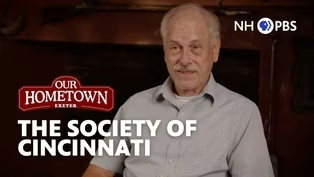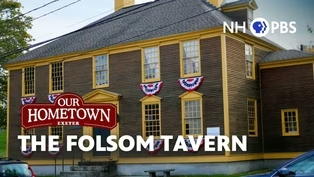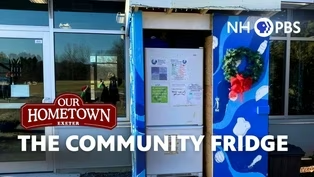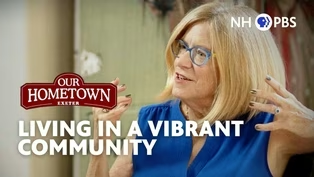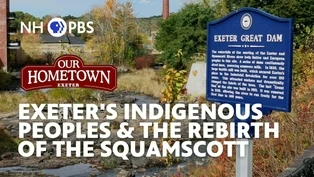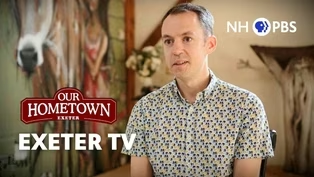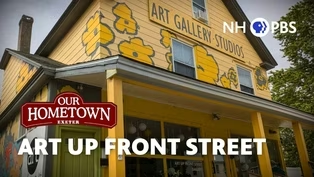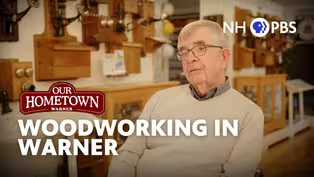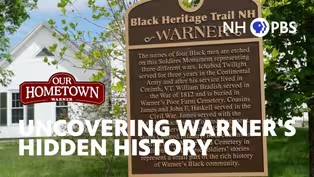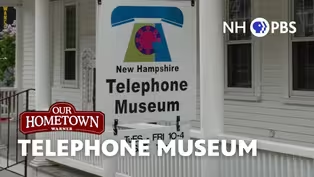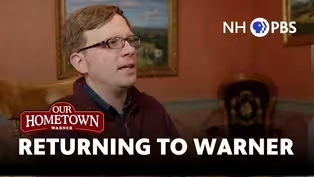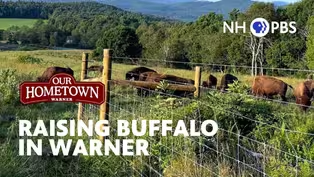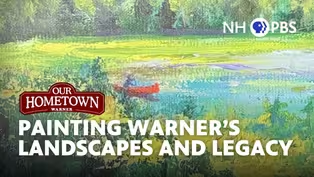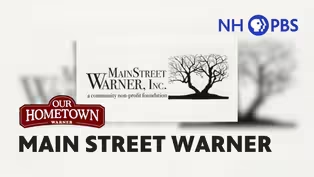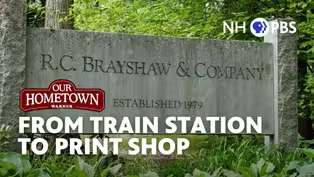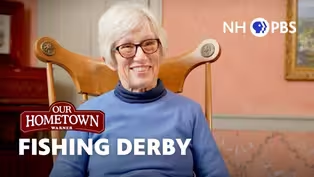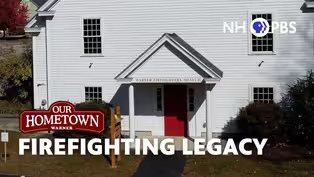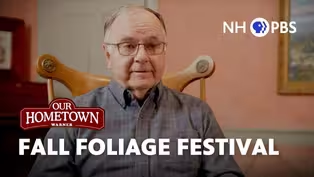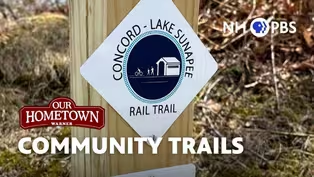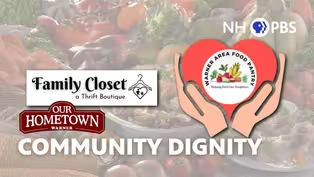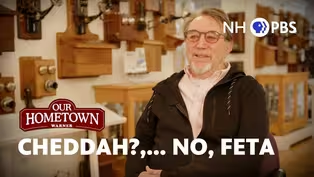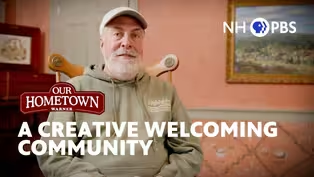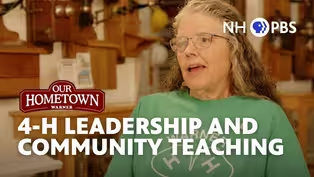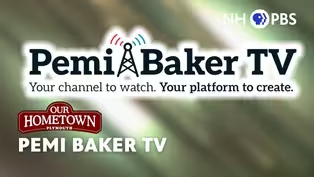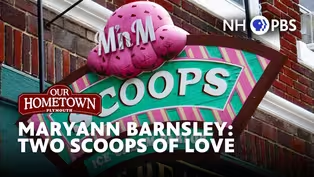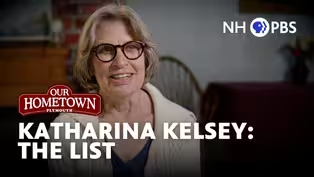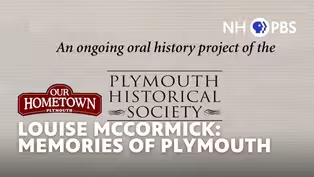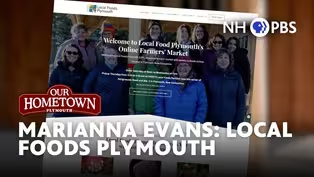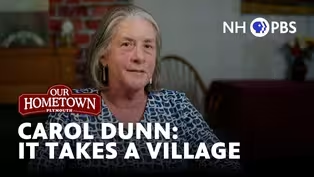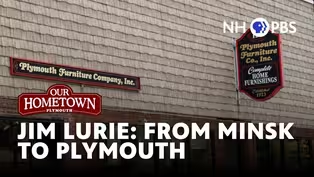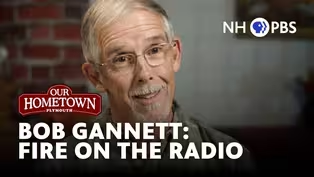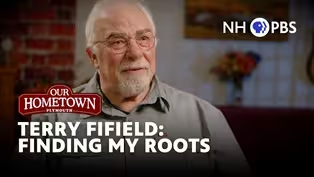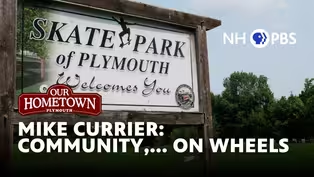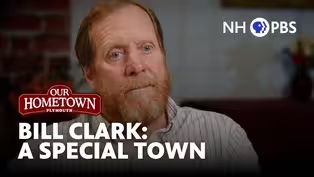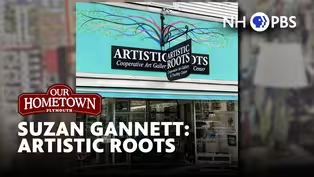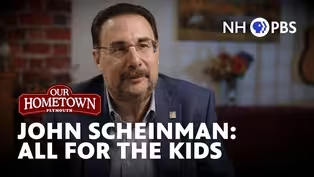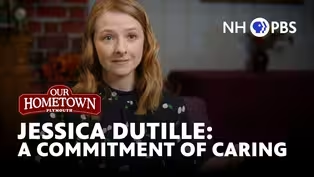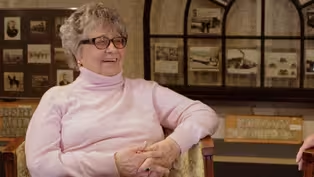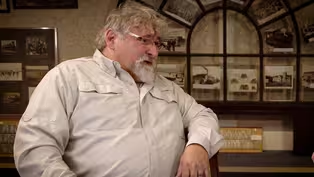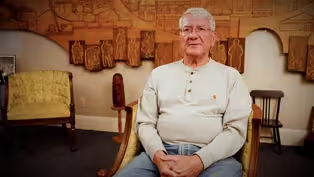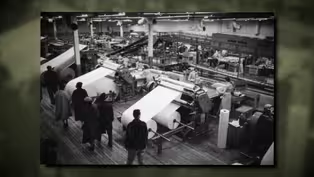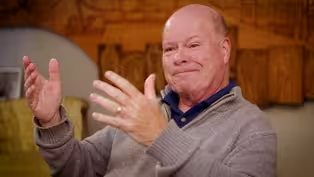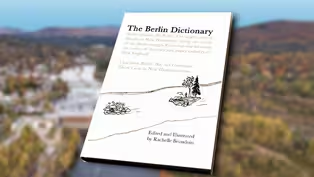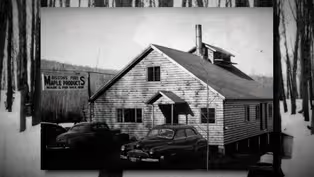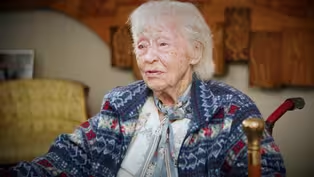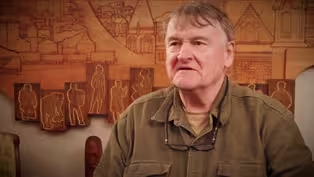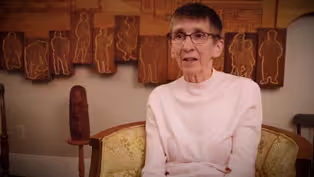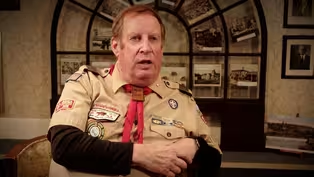Nashua | Diversity and Mental Health
Clip | 5m 42sVideo has Closed Captions
Lisa Velasquez speaks about the need for access to services for all the neighborhoods.
Lisa Velasquez speaks about the need for access to services for all the neighborhoods of Nashua.
Problems playing video? | Closed Captioning Feedback
Problems playing video? | Closed Captioning Feedback
Nashua | Diversity and Mental Health
Clip | 5m 42sVideo has Closed Captions
Lisa Velasquez speaks about the need for access to services for all the neighborhoods of Nashua.
Problems playing video? | Closed Captioning Feedback
How to Watch
is available to stream on pbs.org and the free PBS App, available on iPhone, Apple TV, Android TV, Android smartphones, Amazon Fire TV, Amazon Fire Tablet, Roku, Samsung Smart TV, and Vizio.
One of my favorite memories is moving to Nashua in my senior year of high school.
I was not happy just because of relocation at that moment in time.
But one of the memories that just sticks out in my mind is walking to the bus stop and having people say good morning in on the way to the bus stop and stop me on my tracks.
Because in New York City, people don't talk to you and having people say good morning.
Like, that's just a memory that sticks out of like how neighborly and friendly Nashuans are.
So that's one of my favorite memories of being in Nashua, specifically.
I've been at the Division of Public Health for over eight years, almost nine.
And the work has really changed from when I started to now.
I started as the Substance Misuse Prevention coordinator, and I really focused on substance misuse prevention programs, things like parenting classes and mostly education on the opioid crisis.
Because when I started, that was like the priority, and that's what everybody was talking about.
So I was doing, going around not only in Nashua but the surrounding towns and doing like, you know, opioid forums and talking to people about the dangers of opioids and what was going on and how we could support our youth in maintaining or preventing them from starting to use.
And I think the thing that has changed over time is that more and more of my presentations and talks are in diverse languages than when I started.
I think that's the most stark thing that when I think about the community in Nashua, it's changed.
But not only has it changed, but the Latino community specifically is a lot more vocal and says, Hey, you're missing me if we're not talking to them.
So I think that's the biggest takeaway for me is that I'm Latina.
I can't not listen to the Latino community and they're very loud and clearly say, I'm here and we need services and equitable access to not just services, but also health information.
So the diversity in Nashua has grown.
I mean, I've seen it grow since like graduating high school.
We had the Latino, like the Spanish club or the Latino club, and it was really small.
And now I think it's about over 20% of the students are of Latino descent.
So I think that's beautiful.
But there's also diversity, not just within the Latino community, but there's also other communities in Nashua, like a beautiful Indian American community.
There's Native Americans.
There's, you know, African-American community.
There's some refugees from Africa that also have settled here.
So they all bring different foods.
I always bring up food because I love food, but also different languages, different music, different just ways of interacting with each other.
And I find that my coworkers, whether they're from Brazil or they're from the Congo or from Puerto Rico, they're just all very welcoming.
They want to share their food, they want to share their experiences, they want to share their culture.
And it's just beautiful, to learn a little bit more.
And I think I'm just curious in nature that I want to learn a little bit more about everything.
So one of the projects that we're working on is a podcast about mental health that's called Speaking Our Minds.
It's a podcast in five different languages.
So I was able to learn welcome in five languages.
So I'm really excited about that.
But it's just one of the things I think that not just in American culture but in all cultures, we don't talk enough about, we don't talk enough about our mental health.
So we need to bring a lot of culture, cultural, culturally relevant information, culturally sensitive information, and culturally accurate information to people.
So that is really a challenge when you're working with five different languages and five different cultures to make sure that you're not just telling people like, this is the diagnosis, these are signs and symptoms and you need to get help.
But culturally, how do we talk about these things already?
Because we all know that mental health is a thing, whether we want to, whether we see it in from the spiritual lens, whether we see it from that moral lens or whether we see it from like a diagnosable like medical lens, we all see it.
We just might talk about it and experience it in a different way.
Exeter | The Society of Cincinnati
Video has Closed Captions
Clip | 6m 13s | Dana tells us about the genesis of the Society of Cincinnati in New Hampshire. (6m 13s)
Video has Closed Captions
Clip | 5m 57s | Rebeccah tells us about the beautiful architecture & rich history of the Folsom Tavern. (5m 57s)
Video has Closed Captions
Clip | 4m 11s | Alexis Cargill speaks about the Community Fridge; a self-serve food clearinghouse. (4m 11s)
Exeter | Living in a Vibrant Community
Video has Closed Captions
Clip | 3m 30s | Cathleen Toomey talks about moving to, and living in such a diverse, thriving community. (3m 30s)
Exeter | Indigenous Peoples & the Rebirth of the Squamscott
Video has Closed Captions
Clip | 6m 28s | Denise and Paul Pouliot tell us about the indigenous roots of many of the area names. (6m 28s)
Video has Closed Captions
Clip | 5m 21s | Bob Glowacky tells us about the many things that Exeter TV is doing to connect & build community. (5m 21s)
Video has Closed Captions
Clip | 4m 39s | Rose talks about the vibrant art community in Exeter, and how she started her studio & gallery. (4m 39s)
Warner | Woodworking in Warner
Video has Closed Captions
Clip | 2m 10s | Jim McLaughlin shares how woodworking deepened his bond with Warner. (2m 10s)
Warner | Uncovering Warner's Hidden History
Video has Closed Captions
Clip | 5m 7s | Discover Warner’s untold Black history with local historian Rebecca Courser. (5m 7s)
Video has Closed Captions
Clip | 6m 22s | Graham Gifford shares how Warner’s telephone museum came to life—surprising all. (6m 22s)
Video has Closed Captions
Clip | 2m 53s | Ian Rogers shares how travel and Warner’s community shaped his independent spirit. (2m 53s)
Warner | Raising Buffalo in Warner
Video has Closed Captions
Clip | 4m 47s | Brian & Kira Farmer share why they moved to Warner and raise buffalo on their farm. (4m 47s)
Warner | Painting Warner's Landscapes and Legacy
Video has Closed Captions
Clip | 2m 17s | Artist Mimi Wiggin paints her family’s legacy and Warner’s landscapes and traditions. (2m 17s)
Video has Closed Captions
Clip | 7m 57s | Neil Nevins tells about their non-profit, "Main Street Warner". (7m 57s)
Warner | From Train Station to Print Shop
Video has Closed Captions
Clip | 5m 56s | Jeremy reflects on the vibrant life surrounding Warner’s beloved train station. (5m 56s)
Video has Closed Captions
Clip | 2m 24s | Nancy Martin shares funny, fishy memories from Warner’s kids’ derby. (2m 24s)
Video has Closed Captions
Clip | 5m 1s | The rich history of Warner's fire department. (5m 1s)
Warner | Fall Foliage Festival
Video has Closed Captions
Clip | 2m | Ray Martin reflects on decades organizing the Warner Fall Foliage Festival and service. (2m)
Video has Closed Captions
Clip | 3m 52s | Tim Blagden shares how Warner’s abandoned rails became a community trail vision. (3m 52s)
Video has Closed Captions
Clip | 7m | Apryl Blood and Patty Anderson discussing their roles in the community. (7m)
Warner | Cheddah?,... No, Feta
Video has Closed Captions
Clip | 4m 34s | Author David Elliott speaks about moving to Warner. (4m 34s)
Warner | A Creative Welcoming Community
Video has Closed Captions
Clip | 4m 7s | As a radio guy and author, Matt Esenwine talks about coming to Warner. (4m 7s)
Warner | 4-H Leadership and Community Teaching
Video has Closed Captions
Clip | 5m 41s | Susan Jenna and Abigail R. reflect on decades of 4-H leadership and community teaching. (5m 41s)
Video has Closed Captions
Clip | 3m 15s | Dan Salzer and Jonathon Picard talk about Pemi Baker TV. (3m 15s)
Video has Closed Captions
Clip | 3m | Maryann Barnsley tells us about a childhood dream. (3m)
Video has Closed Captions
Clip | 2m 1s | Katharina Kelsey and her husband made a list, Plymouth checked all the boxes, and so much more. (2m 1s)
Plymouth | The Happiness Quest
Video has Closed Captions
Clip | 2m 34s | Dr. Marie Sanders relates what can happen when an entire town works together to discover happiness. (2m 34s)
Plymouth | Memories, Stories and Cake
Video has Closed Captions
Clip | 5m 41s | Patricia Hoyt came to Plymouth for college, launched her career here. (5m 41s)
Plymouth | Memories of Plymouth
Video has Closed Captions
Clip | 1m 55s | Louise McCormick is a townie. She grew up in Plymouth, and has spent most of her life here. (1m 55s)
Plymouth | Local Foods Plymouth
Video has Closed Captions
Clip | 3m 23s | Marianna Evans talks about Local Foods Plymouth, and how the pandemic helped to create a model. (3m 23s)
Video has Closed Captions
Clip | 2m 21s | Carol Dunn tells about how this amazing town bonded together to save her business on Main Street. (2m 21s)
Plymouth | From Minsk to Plymouth
Video has Closed Captions
Clip | 3m 41s | Jim Lurie tells us how in 1917, his grandfather travelled from Minsk, Russia, across Siberia. (3m 41s)
Video has Closed Captions
Clip | 1m 34s | Bob Gannett speaks about an interesting story unfolding as he was on the radio. (1m 34s)
Video has Closed Captions
Clip | 4m | Terry Fifield has lived in a lot of places, but found that the Plymouth area to be the best. (4m)
Plymouth | Community... on Wheels
Video has Closed Captions
Clip | 6m 14s | Mike Currier talks about the roots of the Plymouth Skate Park. (6m 14s)
Video has Closed Captions
Clip | 1m 45s | Bill Clark talks about, even with growth and progress, Plymouth is a special town. (1m 45s)
Video has Closed Captions
Clip | 4m 19s | Suzan Gannett talks about Artistic Roots, and the programs and passions that it has inspired. (4m 19s)
Video has Closed Captions
Clip | 2m 31s | John Scheinman shares how the skills needed in successfully coaching can be used. (2m 31s)
Plymouth | A Commitment of Caring
Video has Closed Captions
Clip | 5m 1s | Jessica Dutille talks about re-building community, after the pandemic changed the world. (5m 1s)
Video has Closed Captions
Clip | 4m 16s | Yvonne recalls growing up in Berlin, and speaking two languages in school. (4m 16s)
Video has Closed Captions
Clip | 6m 41s | Andre speaks to us about growing up in Berlin. (6m 41s)
Video has Closed Captions
Clip | 12m 40s | Walter tells us about Berlin's Skier/Soldier, Paul Petersen, and a love story. (12m 40s)
Video has Closed Captions
Clip | 3m 36s | Roland talks about working in every aspect of the paper industry, over 4+ decades. (3m 36s)
Video has Closed Captions
Clip | 4m 19s | Renney tells a couple of great stories about growing up in Berlin. (4m 19s)
Video has Closed Captions
Clip | 5m 37s | Berlin has a language all its own, and Rachelle decided to compile a dictionary of words. (5m 37s)
Video has Closed Captions
Clip | 4m 24s | Olive speaks about growing up in Berlin, in a family that owned Bisson's Sugar House. (4m 24s)
Video has Closed Captions
Clip | 3m 5s | Lorna recalls heading into Berlin on Friday nights, for shopping & meeting up with friends (3m 5s)
Video has Closed Captions
Clip | 3m 54s | Moving to Berlin was a dream come true for Haven, as he loved working in the woods. (3m 54s)
Video has Closed Captions
Clip | 2m 43s | Diane talks about going from a 45 year career in the banking industry. (2m 43s)
Video has Closed Captions
Clip | 6m 40s | Dennis tells the story of the history of boy scouts in Berlin, NH. (6m 40s)
Providing Support for PBS.org
Learn Moreabout PBS online sponsorshipSupport for PBS provided by:
